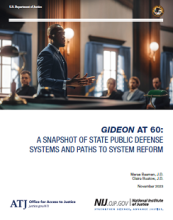Defense counsel
Plight of the Indigent Accused in America - An Examination of Alternative Models for Providing Criminal Defense Services to the Poor, Volume 2 - Policy-Makers' Report
Weighted Dispositions - Adding Quality to Performance Measurement
Measuring the Severity of Criminal Penalties - Provisional Results
Examining Local Legal Culture - Practitioner Attitudes in Four Criminal Courts
DEFENSE ATTORNEY'S ROLE IN PLEA BARGAINING
How Much Difference Does the Lawyer Make? The Effect of Defense Counsel on Murder Case Outcomes
Gideon at 60: A Snapshot of State Public Defense Systems and Paths to System Reform
Indigent Defense Environmental Scan
Building Better Indigent Defense Systems
21st Century Criminal Defense Practice: An Examination of the Impact of Holistic Defense in Wayne County, Michigan
Gideon at 60
Summarizing A Snapshot of State Public Defense Systems and Paths to System Reform
Client Perspectives of Holistic Defense: Strengthening Procedural Justice through Enhanced Client Trust
Youth Defense Delivery Systems and Associated Outcomes
The Evolving Character of Public Defense: Comparing Criminal Case Processing Effectiveness and Outcomes Across Holistic Public Defense, Traditional Public Defense, and Privately Retained Counsel
Efficiency, Timeliness, and Quality: A New Perspective From Nine State Criminal Trial Courts (Full Report)
National Institute of Justice Forensic Science Strategic Research Plan, 2022-2026 (Version 1.1)
"Satan's Minions" and "True Believers": How Criminal Defense Attorneys Employ Quasi-Religious Rhetoric and What It Suggests about Lawyering Culture
The Effects of Holistic Defense on Criminal Justice Outcomes
Early Representation by Defense Counsel Field Test - Final Evaluation Report - Executive Summary
Early Representation by Defense Counsel Field Test - Final Evaluation Report
The University of Alabama System and the Alabama Department of Forensics National Center on Forensics
Expanding Research to Examine the Impacts of Forensic Science on the Criminal Justice System
In 2004, the National Institute of Justice created the social science research on forensic sciences (SSRFS) research program to explore the impact of forensic sciences on the criminal justice system and the administration of justice. Much of the early research from the SSRFS program focused on DNA processing and the use of DNA in investigations and prosecutions.
See the YouTube Terms of Service and Google Privacy Policy




